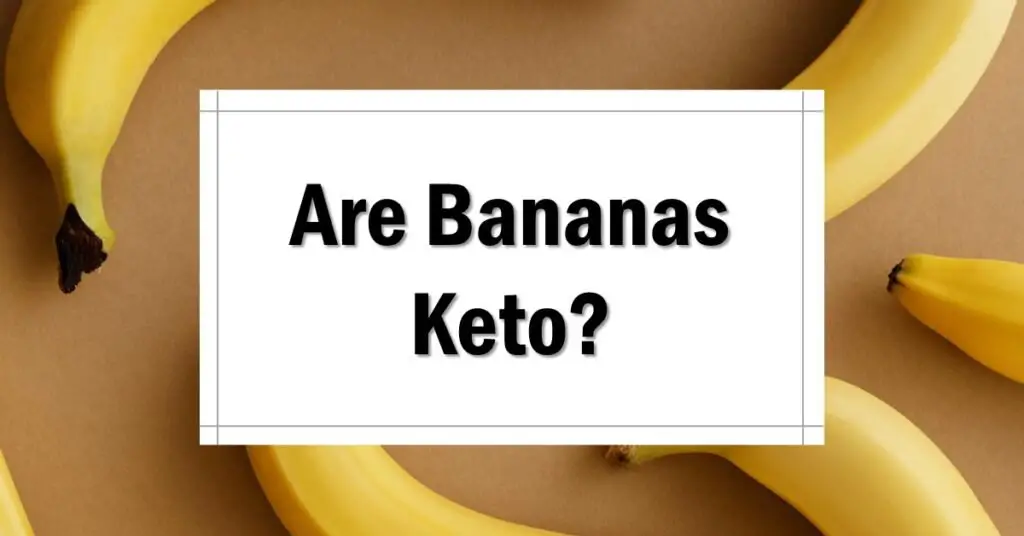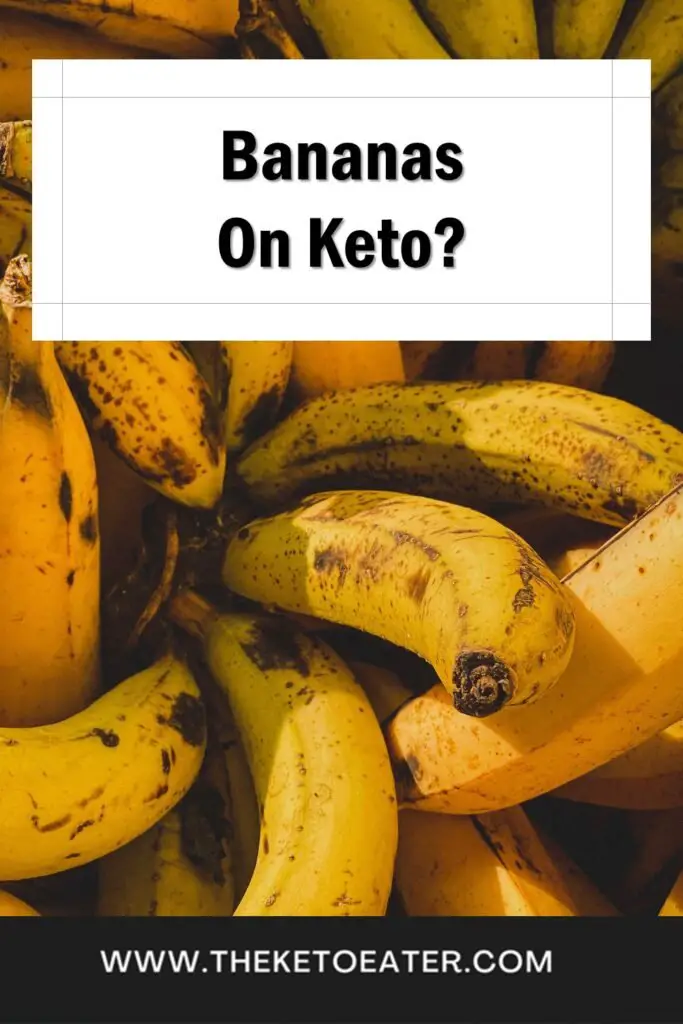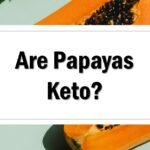In this article, we will answer the question, are bananas keto friendly? A lot of people are afraid of fruit on a keto diet, however, you don’t have to be. We will take you through what fruits can be eaten on a keto diet, as well as which ones you should avoid, and which can be eaten in moderation.
Disclosure: Some of the links in this article may be affiliate links, meaning that we may earn a small commission if you click through using our link and make a purchase. Please be assured that this will not cost you any extra money. Also, please be assured that we either use the products we recommend personally, or have been recommended by trusted friends who currently use them.
Are Bananas Keto Friendly?
So, can I eat bananas on a keto diet?
No, you cannot eat bananas on a keto diet. This is because bananas are high in net carbs per serving. For more on how many net carbs are in bananas read on and we will take you through what this means below.

For more on the best fruits to eat on a keto diet, and those to avoid, check out our article which covers the best and worst fruits to eat on keto.
Nutritional Value Of Bananas
When examining one serving of bananas, the nutritional value is as follows:
- Carbohydrates: 26.95 grams
- Fiber: 3.1 grams
- Fat: 0.39 grams
- Sugars: 14.43 grams
- Protein: 1.29 grams
- Calories: 105 calories
Now we know the nutritional value of bananas, let’s have a look at how many net carbs that equates to.
How Many Net Carbs In Bananas
Bananas have 23.85 grams of net carbs.
Net carbs are calculated by deducting the total amount of fiber (3.1 grams) from the total number of carbs (26.95 grams), giving us the total number of net carbs of bananas: 23.85 grams.

Fruits That You Can Eat On The Keto Diet
There are a number of fruits that you can eat on a keto diet. Some people get confused, and think that you cannot eat any fruit on a keto diet.
This is not the case.
Some fruits are lower in sugars than others, this means that they are keto approved, in moderation.
We’ve listed some of our favorites below for you.
- Coconut [2.85 grams / 1 medium piece]
- Lemons [3.81 grams / 1 medium piece]
- Guavas [4.88 grams / 1 medium piece]
- Cantaloupe Melon [5.03 grams / 1 wedge serving]
- Limes [5.16 grams / 1 medium piece]
- Blackberries [6.24 grams / 1 cup serving]
- Boysenberries [6.24 grams / 1 cup serving]
- Youngberries [6.24 grams / 1 cup serving]
- Raspberries [6.69 grams / 1 cup serving]
- Cranberries [8.32 grams / 1 cup serving]
- Berries [8.49 grams / 1 cup serving]
- Strawberries [8.67 grams / 1 cup serving]
- Cherries [9.49 grams / 10 pieces]
- Oheloberries [9.58 grams / 1 cup serving]
- Red Sour Cherries [10.95 grams / I cup]
- Blueberries [17.51 grams / 1 cup serving]
Fruits can be a great source of fiber on keto. However, it’s essential that you remember to portion out fruits on keto to ensure that you do not overeat them.
The net carbs in fruits can soon add up and put you over your daily carb limit.
Fruits That You Cannot Eat On The Keto Diet
Fruits that are likely to sabotage your keto journey have been listed below. These should be avoided on a keto diet.
Not eating fruits on a keto diet can seem counter intuitive after years of being told they are great for weight loss.
Below is a list of fruits that you should avoid on the keto diet, including their net carb count. This includes some canned fruits and variations on the original.
List Of Fruits To Avoid On Keto
- Grapes [0.41 grams / 1 medium piece]
- Plums [6.64 grams / 1 medium piece]
- Peaches [7.85 grams / 1 medium piece]
- Figs [8.19 grams / 1 medium]
- Pineapples [9.41 grams / 1 medium piece]
- Tangerines [9.71 grams / 1 medium piece]
- Dried Fig [10.24 grams / 1 piece serving]
- Honeydew Melon [10.36 grams / 1 wedge serving]
- Loganberries [11.15 grams / 1 cup serving]
- Mulberries [11.32 grams / 1 cup serving]
- Canned Apricots in Water [11.63 grams / 1 cup serving]
- Peaches in Water Pack [11.71 grams / 1 cup serving]
- Nectarines [12.05 grams / 1 medium piece]
- Oranges [12.29 grams / 1 medium piece]
- Raisin Sauce [13.31 grams / 1/4 cup]
- Litchis [14.67 grams / 10 pieces]
- Apricots [15.05 grams / 1 cup sliced]
- Canned Mandarin Oranges (Drained) [15.48 grams / 1 cup serving]
- Apples [15.76 grams / 1 medium piece]
- Grapefruit [17.88 grams / 1 medium piece]
- Red Sour Cherries in Water Pack [19.11 grams / 1 cup serving]
- Watermelon [20.49 grams / 1 wedge serving]
- Pears [20.56 grams / 1 medium piece]
- Chinese Gooseberries (Kiwi Fruit) [20.65 grams / 1 cup serving]
- Bananas [23.85 grams / 1 medium piece]
- Papayas [24.32 grams / 1 medium piece]
- Peaches in Extra Light Syrup [24.92 grams / 1 cup serving]
- Sweet Cherries in Water Pack [25.46 grams / 1 cup pitted serving]
- Canned Apricots in Juice [26.21 grams / 1 cup serving]
- Canned Apricots in Extra Light Syrup [26.88 grams / 1 cup serving]
- Rasins [27.4 grams / 1/4 cup]
- Milk Chocolate Coated Raisins [28.84 grams / 1/4 cup]
- Figs in Water Pack [29.2 grams / 1 cup serving]
- Seeded Raisins [29.57 grams / 1/4 cup]
- Seedless Golden Raisins [31.2 grams / 1/4 cup]
- Carob Covered Raisins [31.25 grams / 1/4 cup]
- Chocolate Covered Raisins [31.37 grams / 1/4 cup]
- Mangos [31.49 grams / 1 medium piece]
- Peaches in Light Syrup Pack [33.22 grams / 1 cup serving]
- Fruit Cocktail in Light Syrup [33.73 grams / 1 cup serving]
- Yogurt Covered Raisins [33.75 grams / 1/4 cup]
- Fruit Salad in Light Syrup [35.65 grams / 1 cup serving]
- Canned Apricots in Light Syrup [37.72 grams / 1 cup serving]
- Mandarin Oranges in Light Syrup Pack [39 grams / 1 cup serving]
- Canned Mandarin Oranges [39 grams / 1 cup serving]
- Sweet Cherries in Light Syrup [39.77 grams / 1 cup pitted serving]
- Figs in Light Syrup [40.73 grams / 1 cup serving]
- Spiced Peaches in Heavy Syrup Pack [45.49 grams / 1 cup serving]
- Red Sour Cherries in Light Syrup [46.64 grams / 1 cup serving]
- Peaches in Heavy Syrup Pack [48.84 grams / 1 cup serving]
- Sweet Cherries in Heavy Syrup [50.01 grams / 1 cup pitted serving]
- Canned Apricots in Heavy Syrup [51.29 grams / 1 cup serving]
- Frozen Sweet Cherries [52.51 grams / 1 cup pitted serving]
- Figs in Heavy Syrup [53.61 grams / 1 cup serving]
- Frozen Sweetened Apricots [55.44 grams / 1 cup serving]
- Frozen Sliced Peaches Sweetened [55.45 grams / 1 cup serving]
- Red Sour Cherries in Heavy Syrup [56.77 grams / 1 cup serving]
- Sweet Cherries in Extra Heavy Syrup [64.56 grams / 1 cup pitted serving]
- Peaches in Extra Heavy Syrup Pack [65.68 grams / 1 cup serving]
- Figs in Extra Heavy Syrup [72.71 grams / 1 cup serving]
- Red Sour Cherries in Extra Heavy Syrup [74.19 grams / 1 cup serving]
- Dried Fruit Mixture [78.04 grams / 1 cup serving]
- Stewed Apricots [81.22 grams / 1 cup serving]
- Stewed Peaches [82.62 grams / 1 cup serving]
- Dried Cranberries [84.3 grams / 1 cup serving]
- Dried Peaches [85.03 grams / 1 cup serving]
*nutritional values taken from FactSecrets.
This is by no means an exhaustive list; it is designed to give you an indication of which fruits to avoid.
Why Are Fruits Such a Contentious Issue?
After years of trying a low calorie diet, I was used to fruit being an all you can eat buffet. However, this is different for a keto diet, foods need to fit into your macros.
Fruits contain fructose, which is a sugar with a GI of 23.
The Glycemic Index (GI) is a way of rating carbohydrates. All sugars are carbohydrates.
The GI is rated from 0-100. In simple terms, it measures how quickly a food will affect your blood sugar(glucose) levels when you eat that food, or in the case of sugars, normally a food that contains the sugar.
A GI of 23 is higher than we would normally like on a keto diet, which is why some fruits should be avoided, and others can be eaten in moderation.
If you have been living a keto diet for any time, you will likely know that one of the main aims is to regulate your blood sugar levels.
It is the spiking up of blood sugar levels that leads to that euphoric feeling, followed by a feeling of hunger, which makes you want to eat more.
That’s why not long after eating an apple you feel hungry again. You will it the apple, your blood sugar will spike, which will make you feel good, and then it will drop, which will leave you craving more food/sugar.
It is by controlling these blood sugar levels which prevents cravings for further sugary foods.
Foods scoring zero, or as close to zero as possible, will not spike your blood sugar levels.
These foods are broken down more slowly. Foods that are closer to the higher end of the GI are broken down quickly in the body causing a rapid increase in blood glucose levels.
It is for this reason that sugars are limited on the keto diet, if not your blood sugar levels would constantly be yo-yo-ing, which is really hard to control.
This is not healthy for anybody. More importantly, it will make it very difficult for your body to remain in a state of ketosis.
If you are interested in finding out more about keto sugars, check out our ultimate guide to keto friendly sugars, which will take you through everything you need to know.
If some of these terms and abbreviations have been confusing, we have guides available for you.
If the ketogenic diet in its own right is confusing, check out our keto 101 guide, which will take you through everything you need to know to get started on your keto journey.
Wrapping Up: Are bananas keto friendly?
In summary, no, you cannot eat bananas on a keto diet. However, there are many amazing keto friendly fruit options out there that you can enjoy, and remain in ketosis.
What are your favorite fruits to enjoy on a keto diet? Let us know in the comments below.


